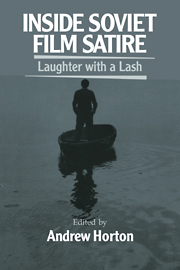Book contents
- Frontmatter
- Contents
- Foreword: If life itself is a satire …
- Acknowledgments
- Editor's note
- Introduction: Carnival versus lashing laughter in Soviet cinema
- Part One The long view: Soviet satire in context
- Part Two Middle-distance shots: The individual satire considered
- VI A subtextual reading of Kuleshov's satire The Extraordinary Adventures of Mr. West in the Land of the Bolsheviks (1924)
- VII The strange case of the making of Volga, Volga
- VIII Circus of 1936: Ideology and entertainment under the big top
- IX Black humor in Soviet cinema
- X Laughter beyond the mirror: Humor and satire in the cinema of Andrei Tarkovsky
- XI The films of Eldar Shengelaya: From subtle humor to biting satire
- Part Three Close-ups: Glasnost and Soviet satire
- Filmography
- Contributors
- Index
X - Laughter beyond the mirror: Humor and satire in the cinema of Andrei Tarkovsky
Published online by Cambridge University Press: 07 October 2009
- Frontmatter
- Contents
- Foreword: If life itself is a satire …
- Acknowledgments
- Editor's note
- Introduction: Carnival versus lashing laughter in Soviet cinema
- Part One The long view: Soviet satire in context
- Part Two Middle-distance shots: The individual satire considered
- VI A subtextual reading of Kuleshov's satire The Extraordinary Adventures of Mr. West in the Land of the Bolsheviks (1924)
- VII The strange case of the making of Volga, Volga
- VIII Circus of 1936: Ideology and entertainment under the big top
- IX Black humor in Soviet cinema
- X Laughter beyond the mirror: Humor and satire in the cinema of Andrei Tarkovsky
- XI The films of Eldar Shengelaya: From subtle humor to biting satire
- Part Three Close-ups: Glasnost and Soviet satire
- Filmography
- Contributors
- Index
Summary
The very title of this presentation ought to produce at least a chuckle, if not hearty laughter, from readers. But to recognize that the very idea of analyzing Tarkovsky's films for their humorous content is in itself funny and perhaps even preposterous, one needs (a) to know the films themselves (they are generally seen as complex, weighty, serious, philosophical and metaphysical ruminations on the human condition, tending more to tragedy than comedy) and (b) to understand the myth created around Tarkovsky's persona over the span of an almost-thirty-year career, both in the Soviet Union and in the West. Inseparably linked to his highly autobiographical films, Tarkovsky was a “martyr,” persecuted by an uncaring Soviet cinema bureaucracy, and, like his fellow countryman Alexander Solzhenitsyn, a “prophet” who railed against the materialism and loss of spirituality in contemporary societies, whether in the East or the West. Thus, I am not only trying to offer an original interpretation of Tarkovsky's work, but, hopefully, with the full complicity of my audience, attempting to undercut what has become a highly pompous rhetoric on Tarkovsky. Even in my title, then, one is immediately faced with the dialogic nature of comedy and the conspiratorial relationship between author and reader in producing laughter.
- Type
- Chapter
- Information
- Inside Soviet Film Satire , pp. 98 - 104Publisher: Cambridge University PressPrint publication year: 1993
- 1
- Cited by

